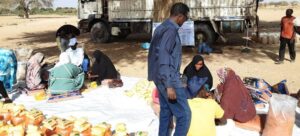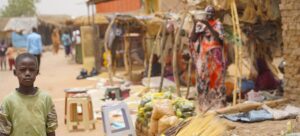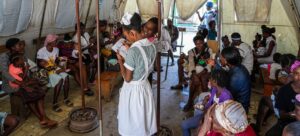That’s the message from Louise Wateridge, Communications Officer with the UN agency that assists Palestine refugees, UNRWA, who is stationed in the southern city of Rafah.
Ms. Wateridge had worked with UNRWA before and recently returned to the region and was shocked by what she saw on a visit to Gaza City, a place she knows well.
Unbelievable devastation
“It didn’t feel real seeing out of every single window in the car, as far as you could see was just destruction,” she told UN News.
Ms. Wateridge has been using her mobile phone to document the devastation in places such as Khan Younis, where she visited an abandoned UNRWA school-turned-shelter that once housed tens of thousands of displaced people who hastily fled the facility ahead of Israeli bombardment.
“It was devastating to see unmarked graves, even in the corner of our facility in the Khan Younis Training Centre,” she said. “On the wall above one of the children’s graves there was a message saying ‘Marwa, your sister misses you and loves you.’”
This interview has been edited for clarity and length.
Louise Wateridge: Over the last couple of days I’ve been to Gaza City and Jabalia camp, and also in Khan Younis. I’ve worked in the region for the last four years, so it’s my first time being here since the war began and it’s just unbelievable to see Gaza City. We went with the World Food Programme (WFP) on a joint mission to the Jabalia camp. The agencies are working very closely in the north to try to expand food distribution there. But the drive up was absolutely shocking for me. Just this city that I’ve known for years, and seeing everything around you just completely flattened.
There were homes because you could see where they were still standing. There were walls missing, and you could see into the living rooms, into the dining rooms. It’s like there was life there. You can very clearly see life there – pictures on the wall, clothes kind of around the room – but there’s nobody in there. It was a very haunting, shocking experience.
You referenced the video I took. I was sitting in the front of the car. Everywhere I was looking there was destruction. Your mind can’t even process that it’s real to see that much devastation in front of you.
But then as we went to Jabalia, the markets kind of pick up and you see more people around. The really good news from our trip is it appears that within the last few weeks, there’s been a lot more commercial food on the market, so there were a lot more people at the markets.
My colleagues who have been here a lot longer than I have were explaining that two or three weeks ago, it was a very different place. People were very, very hungry; very scared. There was not a lot available in the market, whereas when we went this weekend, it was very positive to see that that had somewhat shifted. The agencies are going to continue to work together, UNRWA and WFP, to make sure that people in the north do have the food that they need after all of this time.
UN News: Was UNRWA able to provide any assistance during this trip to Jabalia?
Louise Wateridge: The trip was more of an assessment to review the facilities that UNRWA has. 165 facilities across the Gaza Strip have been attacked or damaged, so we really need some space and some warehouse and distribution areas that we can offload the food and then distribute to the community.
So, this trip was an assessment of those facilities to see where we could restore, where we could start using again. There was one warehouse that had bullet holes throughout the roof and some of them had walls missing, so they really are in a very bad way, and they’ve been very severely damaged.
We also visited our colleagues. I was with the Director of UNRWA affairs in Gaza, Scott Anderson, and he was talking to and meeting with our colleagues in the north in Jabalia who have been running the health services throughout the whole duration of the war.
We have a group of incredible colleagues who have still been going to work every day. They themselves are displaced. I spoke to some of the women in the group and it’s devastating. They’ve all lost something. Many of them have lost more than you can imagine. And they talk about how they have homes now without walls that they’re still living in.
They really have gone a very long time without food. They discuss the struggles they’ve had with going to work and serving the community, and then going home to their children in the evening, trying to put food on the table while they’re still at work all the time.
UN News: Do they feel a little safer now?
Louise Wateridge: I don’t think anyone feels safe. No, not at all. There was a feeling of slight relief that there was more food available. Even just seeing UNRWA and WFP working together in the north, they were very hopeful for this opportunity that these two organizations will expand the food distribution in the area. But they’re tired. They’re very tired. They’re very scared.
They’ve been through more than we could imagine the last six-and-a-half months. And they are very scared of what tomorrow brings. They are very scared if more military action will happen. They’re scared if they’ll be displaced again. They’re scared of the nights.
I don’t think anyone feels safe.
They explained that they get home with their children and how their children feel at home; the way they sleep together and huddle together in fear. There’s just no safety here. No one feels safe.
UN News: Tell us about your trip to Khan Younis.
Louise Wateridge: We went to Khan Younis on a joint mission with the UN Mine Action Service (UNMAS) to sweep the area and assess the area for any potential shrapnel, any potential unexploded ordnance in the UNRWA facilities there. It was devastating to see the facilities that we visited – a training centre, health clinic and two schools. I know all of these facilities from before the war, so it was completely devastating to see the condition that they were in now. And the thing that really shocked me the most was it was very evident how quickly people had fled these facilities. We’re talking about four huge UNRWA compounds.
There were tens of thousands of people sheltering in these UNRWA facilities, and almost overnight they had to evacuate. There was an Israeli forces’ warning to evacuate Khan Younis and evacuate these UNRWA facilities.
Walking around, there were shoes, children’s shoes – one here, one there; toothbrushes, hairbrushes, clothes, socks. You could see kind of half-eaten food.
And it just seemed that everything had been abandoned very, very quickly. Nobody had the luxury to pack up even what they had there, and it’s not like they had an abundance of things with them at this point. And yet, there was still so much left behind.
Some of our colleagues in the training centre were sharing their experiences of this situation, saying how terrified they were then, how terrifying it was for everyone sheltering there. They really had to evacuate within a matter of hours.
It was devastating to see unmarked graves, even in the corner of our facility in the Khan Younis Training Centre. There were some graves for children. On the wall above one of the children’s graves there was a message saying “Marwa, your sister misses you and loves you.”
You cannot believe it’s a UN facility. You cannot believe that this is a place that people thought they were safe. Walls of the perimeter were completely knocked down.
Bullet holes throughout every room, almost every classroom. There was clear damage to the roof that had come through. So, the whole experience in Khan Younis was devastating, really beyond devastating.
UN News: I would like to ask you about our colleague Abdullah, the photojournalist who survived the bombardment in the north but had to have his legs amputated. Could you tell us more about his condition?
Louise Wateridge: We had some really good news this week that our colleague Abdullah was medically evacuated out of Gaza and is now in Doha, so we’re absolutely thrilled. Everyone at UNRWA is so relieved that he and his family are no longer in Gaza. I saw Abdullah on Tuesday, alongside some colleagues who had been visiting him regularly at a field hospital in Rafah.
I think for everyone, it’s like their life ended and then something else has begun.
He needed further surgery that wasn’t possible in Gaza City due to the facility he was in and the medical supplies that were available, so we’re very relieved that he will now be able to receive this treatment. It’s been a horrific journey for Abdullah.
He was taken to Al-Shifa hospital where he initially received treatment. This hospital was then under siege by Israeli forces for two weeks, and Abdullah was inside for the whole duration. We cannot imagine what Abdullah has been through, and we’re all just very relieved and very thankful that he is now getting the treatment that he needs.
Louise Wateridge of UNRWA in Rafah, southern Gaza.
UN News: Finally, in the beginning of the interview, you said that this is not your first time in Gaza. What comes to mind when you see all of this devastation and reflect on your previous experiences? And what’s your message?
Louise Wateridge: Gaza to me has always been a wonderful place to work. The colleagues here are some of the best I’ve ever worked with, not just with UNRWA but anywhere in the world.
I feel so privileged to have these colleagues and friends in my life and it’s just appalling to see the lives that they are now living. I think for everyone, it’s like their life ended and then something else has begun.
My colleague Hussein was showing me pictures and videos of his new apartment that he was moving into at the beginning of October. He showed me a video of the building today and it’s completely destroyed.
Everyone has the same story where they’re now sleeping under plastic sheeting; they’re crammed into rooms with all of their family and neighbours. Nobody knows what’s coming next. Everybody is visibly tired.
I know so many familiar faces here but they all look so different after the last six and a half months. You can just see the suffering a lot of people have been through.
They’ve lost a lot of weight, collectively. Everybody has changed so significantly in what is quite a short amount of time. But they’re all wearing this war.
And I think the biggest problem is they just don’t know what tomorrow brings. There’s a lot of fear for their children. Every day, people wonder if a ceasefire is coming. And that’s what everyone’s hanging on to.











